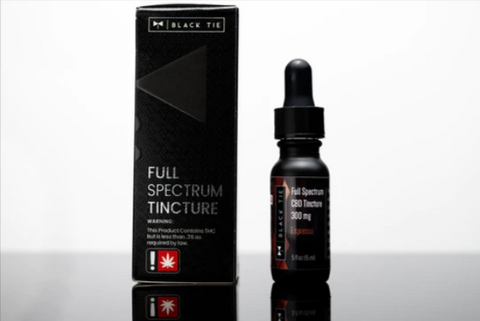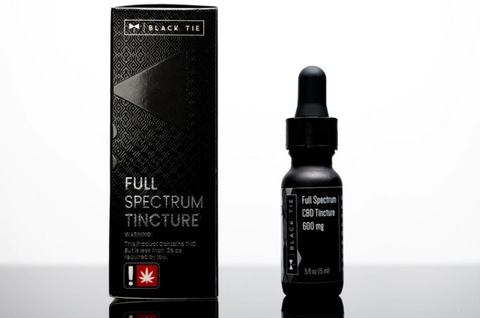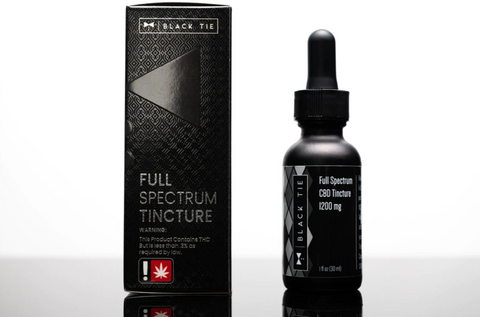A Guide To Choosing A CBD Tincture
March 21, 2022
Buying a CBD tincture can be an overwhelming process, especially when you’re faced with so many factors, like potency, spectrums, price, cannabinoids, and other considerations. Here at Black Tie CBD, we want to simplify the process and give you all the information that you need to make a confident decision in your purchase. We will be covering everything that you need to know.
Firstly, it’s important to highlight the spectrums and the purposes that they serve, so you know which one is best suited for your needs. The spectrum term indicates the number of other substances present in the CBD itself. Even in plants containing very little THC (the psychoactive substance found in cannabis), there are many other chemicals present. These are other cannabinoids, terpenes, and flavonoids.
Full Spectrum vs Broad Spectrum:
If you are a user of CBD, then you have more than likely stumbled across terms such as “full-spectrum” or “broad spectrum”. The main difference between full-spectrum and broad-spectrum CBD is the compounds they contain.
If a CBD product contains several naturally occurring cannabis plant extracts, such as terpenes and other cannabinoids — including up to 0.3% THC — it is full-spectrum CBD.
Broad-spectrum CBD also contains several cannabis plant compounds, but it is typically entirely free of THC. All of the broad-spectrum items on BlackTieCBD.Net are completely THC Free.
Full Spectrum CBD:
Full Spectrum CBD contains the most naturally occurring extracts. This includes a small amount of THC (less than 0.3% THC Delta-9). There is certain scientific evidence of an ‘entourage effect’ – a positive response to the presence of various terpenes in CBD. Taking the full spectrum of terpenes, flavonoids, cannabinoids, fatty acids and trace THC is regarded by some scientists as the most effective way for the entourage effect to work.
Due to the “entourage effect”, full-spectrum CBD is believed to last longer and have more powerful effects than broad-spectrum or CBD isolate
Broad Spectrum CBD:
Broad-spectrum CBD oil is a middle ground between CBD isolate and full-spectrum CBD oils. It has all of the cannabinoids and other chemical compounds except for THC. It has all the beneficial chemical compounds except for THC, so you’re likely to gain some of the beneficial effects of the entourage effect.
Broad-spectrum also goes through the normal extraction process. For places where THC is illegal, the benefit of broad-spectrum CBD oil is that in the final stages of processing, the THC is removed from the extract. Therefore, broad-spectrum CBD oil will not show up on a drug test if the test is looking for THC.
If you're looking for a health boost from CBD but want to skip the THC effects, broad-spectrum is probably your best bet. If you don't mind THC and want to potentially get more benefits out of your CBD product, full-spectrum is probably the way to go.
Potency:
Now that you know which spectrum to choose, it all comes down to choosing the correct strength and potency. When searching for products, you’ll come across a lot of different strengths (potencies). You’ll find ranges from 300 mg to 4000mg per bottle. With so many CBD options to choose from it can make you feel like you have no idea what you’re even looking at. So let’s simplify it;
CBD potency specifically refers to how strong it is. On CBD oil labels, look for the milligrams per milliliter (mg/mL) - that’s what determines the product’s concentration of CBD. If a CBD extract is rated at 300mg, it’s going to be about half as strong (potent) as the same amount of a CBD extract rated at 600mg CBD. But, it also depends on the size of the bottle.
Here is another example where the bottle size is significant. Suppose there are two bottles of CBD oil; both have 300mg of CBD. However, one bottle contains 15ml of liquid, while the other has 30ml. In this case, the smaller 15ml bottle’s CBD concentration is double that of its 30ml counterpart with 20mg of CBD per ml against 10mg.
How to measure your dose:
A single dose of CBD Oil to be .5mL, and depending on the product, this can be easily measured using the marked dropper under the top.
To simplify it further, A 30ml bottle will contain 60 dosages within. If the potency of the bottle is 1200mg, each dose contains 20mg of CBD, while a 15ml bottle will contain 30 dosages within. If the potency of the bottle is 1200mg, each dose contains 40mg of CBD. This should act as your guideline when choosing your dosage, and fortunately we released our tinctures in these specifications to make it easier for our customers.
For example:
Low-potency CBD oil (300 mg)

This is a relatively low-potency oil and is a good option for individuals who are just starting out or who may be sensitive to CBD. A low-strength 300 mg bottle is a good option to take as a daily supplement. Many people take a single daily dose of it for boosted general health, and also to help lower stress levels.
Mid-Potency CBD Oil (600mg)

A 600 mg CBD oil is a good “step-up” option for people who find they’re having to take large (and/or multiple) doses of lower potency. In general, a lot of people use products in this strength range for things like anxiety and day-to-day pain.
High-Potency CBD Oil (1200mg +)

The 1,000 mg range is closing in on the higher end of the potency scale, but some bottles could range to 5000mg and above, with the intention of higher potency in fewer drops. Products in this strength range are commonly used for sleep issues, deep muscle soreness, migraines, and day-to-day stress and anxiety.
So, which one should you choose? As much as we would love to answer that for you, each person is different. A great way to make your choice is to ask yourself why you want to take CBD in the first place and assess which potencies are typically used for those reasons.
Another aspect to consider that not many people pay attention to, but should, is the Cannabinoid used or the combination thereof.
Cannabinoids and combinations:
Cannabinoids are like a buffet to choose from. Choose the ailments you suffer from, and select the product that contains the helpful cannabinoid compounds that work best for you. Most people select CBD as it is the most popular and widely known cannabinoid, which doesn’t necessarily mean that it is the answer to all of your needs.
CBD:
CBD is generally great for overall well-being. It is suitable for general ailments and issues that you might be facing in your life. Over the last few years, CBD has become the cannabinoid of choice, not only for the many therapeutic benefits it offers, but also because it has no psychoactive properties. Unlike THC, CBD offers pain relief and other benefits without the risk of paranoia, anxiety, or impaired cognitive function.
This means that CBD is great for people wanting to target a number of ailments and use it for general health purposes.
CBG:
CBG interacts with the body in a different way. This means it has different effects than CBD does. It is thought that CBG has a calming effect on the body, causing a relaxation of the nerves. There are technical terms for such changes, for example, inhibition of the sympathetic nervous system but rather than be blinded by complex medical terms it is easier to think of CBG as having a nice calming effect. CBG also appears to increase the levels of our natural, in-built cannabinoid called anandamide. This wonderful endogenous cannabinoid quite simply makes us feel good.
This means that CBG is most suitable for people striving for that ‘feel good’ feeling, or the general serenity within the body.
Delta-8:
Like delta-9 THC, delta-8 produces feelings of euphoria, relaxation, and potential pain relief, but they’re a lot milder. For people who don’t want to experience a pronounced “high,” the lower potency may be a benefit. Because of this, Delta 8 can be used to treat a wider range of cancer patients, such as those who won’t use Delta 9 THC because of the anxiety feeling they receive when they take it.
This makes Delta-8 a great sedative and the perfect candidate for people dealing with more intense ailments, but still offers a wide use for overall well-being, too.
With all of that being said, choosing your tincture comes down to three main factors; Spectrum, potency and strength, and finally the cannabinoid or combination of cannabinoids. From this, you should be able to understand and choose the product that best suits your needs. At first glance, it seems to be an overwhelming process, but really it’s quite simple.
Have a look at our selection of tinctures for one that best suits your needs.

